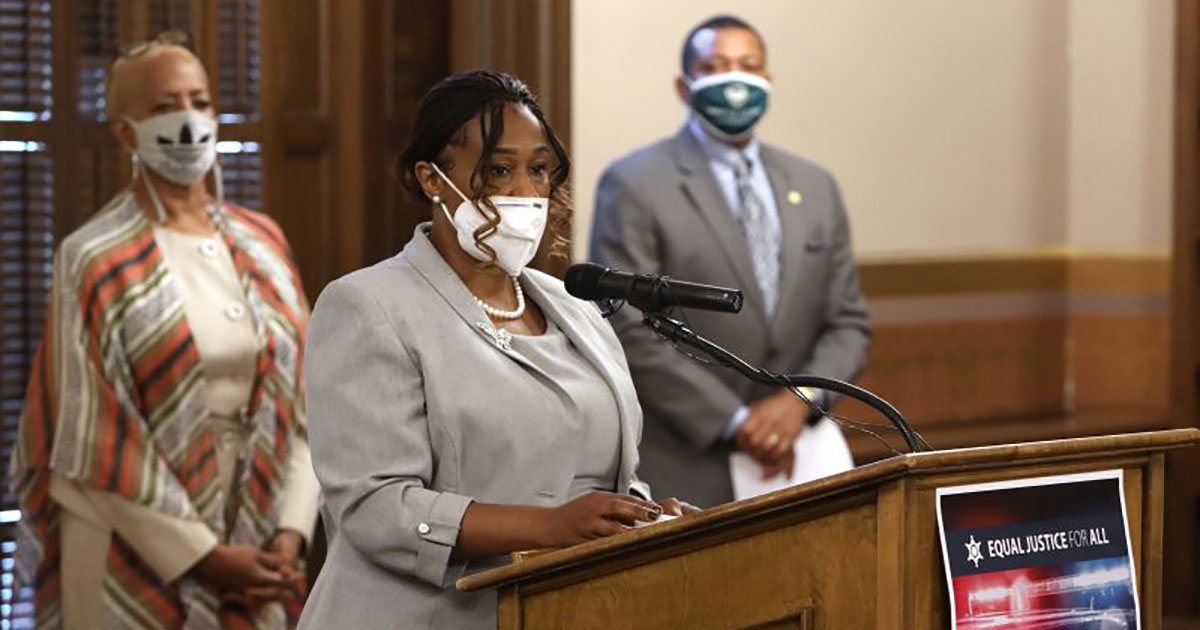- As underscored by recent instances of deadly use of force by law enforcement officers, many of our fellow citizens, particularly in Black and Brown communities, have an inequitable criminal justice experience. Often, the victims of unreasonable force are denied justice due to longstanding “qualified immunity” for unjustified violence perpetrated by law enforcement officers.
- Members of the Detroit and Michigan Legislative Black Caucuses, joined by representatives of the Michigan Association for Justice, announced legislation that will clarify that immunity does not apply to unreasonable use of force. The bills are a part of House Democrats’ four-pillar Equal Justice for All plan, which seeks to reform Michigan’s criminal justice system to be more equitable.
- Law enforcement officers should be afforded protections in the lawful performance of their sworn duties and should be held accountable if their conduct violates the Constitutional rights of citizens or the laws they’ve sworn to uphold.
LANSING, Mich., September 24, 2020, — State Reps. Tenisha Yancey (D-Harper Woods), Tyrone Carter (D-Detroit), Yousef Rabhi (D-Ann Arbor) and Cynthia A. Johnson (D-Detroit) held a press conference today to announce legislation to clarify qualified immunity in instances of the use of unreasonable force by law enforcement. As part of House Democrats’ Equal Justice for All criminal justice reform plan, this legislation will clear an avenue to hold bad actors accountable.
“In keeping with our plan to bring justice, transparency and accountability to Michigan’s criminal justice system, today we announce bills that will address a loophole that has perpetuated police brutality in Michigan”, said Yancey. “For decades, qualified immunity has insulated law enforcement from repercussions, even in instances where their actions violate a civilian’s Constitutional rights or break the very laws they are sworn to uphold. This reform is long overdue.”
Qualified immunity is a legal provision that protects law enforcement officers from tort liability that may arise while they do their jobs. For majority of officers, this is necessary and allows them the protection and flexibility they need to serve their communities. It also prevents law enforcement from being liable for the death or serious injury of civilians if they are acting within the scope of their duty. As a result, law enforcement officers are rarely, if ever, held accountable if their actions unjustly cause serious harm. These violent encounters with police disproportionately affect Black and Brown communities, and qualified immunity contributes to an inequitable criminal justice experience that can have life and death consequences.
“First and foremost, our criminal justice system must provide equal justice for all of us regardless of our ZIP code, social, economic, gender or race,” said Carter, “But in our Black communities, those who promise to serve and protect are essentially given a free pass when they abuse their power. The law applies to police officers, too. When they break the law, even in a minor offense, they should be held accountable. When a life is lost as a result of their neglect or abuse, they must assume liability so justice can be brought to the victims and their families.”
The legislation will amend Michigan’s Governmental Tort Liability Act to remove immunity for law enforcement offices and bar immunity for governmental agencies in unreasonable use of force cases. Courts will be left to determine the reasonableness of force on a case by case basis.
“Qualified immunity shields bad police officers from accountability and undermines the rights of victims of police misconduct to seek justice,” Michigan Association for Justice (MAJ) President Donna MacKenzie said. “No one should be above the law, not even police officers. Unfortunately, they are afforded a different standard of conduct and greater legal protections than would apply to anyone else who injures or violates the civil liberties of another person. It’s time we put an end to qualified immunity. Greater accountability will lead to a safer environment for everyone.”

